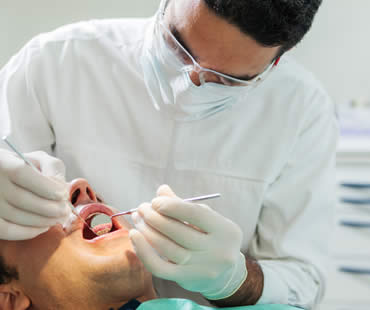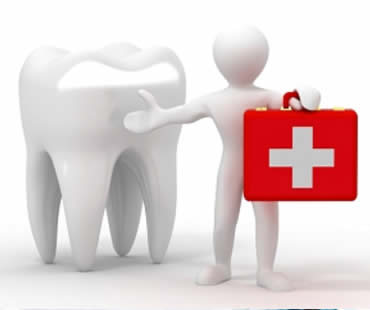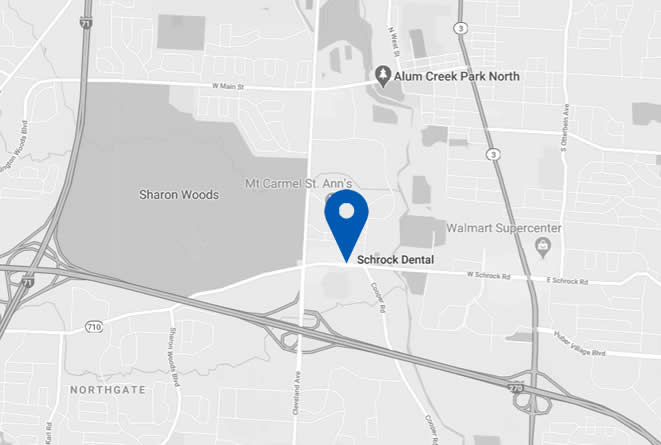
Your teeth and gums are physical assets that you want to keep healthy your whole life, and the best way to do that is to take care of them. Proper dental care needs to begin at a young age so that good habits are established for life. It is a parent’s role to teach children proper hygiene, and to ensure they get professional treatment. Here are some ways that you can help your child learn good dental habits.
Supervise brushing:
Parents should watch children brush their teeth, especially for ages seven and under, to ensure the appropriate amount of toothpaste is used and that none is swallowed. Have your child brush for about two minutes, and make sure all areas of the teeth and gums are cleaned. Provide tips and help as needed.
Establish good eating habits:
Teach your child that diet impacts oral health. Some foods worsen plaque buildup and introduce damaging acid into the mouth, leading to increased tooth decay and higher risk for cavities and gum disease. Certain foods and drinks are also known to stain teeth, or cause bad breath.
Promote water consumption:
Drinking water not only is good for your overall health, it’s also helpful to your mouth. Encourage your child to drink water after eating, especially if it’s not possible to brush teeth right away. Also, fluoridated water is proven to help fight cavities.
Visit the dentist:
Begin taking your child to the dentist around age one, so that the child gets good dental care and learns that dental visits aren’t scary. Have a positive attitude about checkups, and consider taking your child to a pediatric dentist who specializes in children’s oral health.
Be a role model:
As the saying goes, practice what you preach. Set a good example of brushing at least twice daily, flossing every day, limiting your intake of staining foods and drinks, and visiting your dentist regularly.
We look forward to seeing you in our Westerville dental office

It’s a fact of life that teeth can become dingy and yellowed through the years. Your diet, age, personal habits and more affect the shade of your teeth. Even with the best care, it’s nearly inevitable that at some point you’ll want to brighten your smile. Once you pursue teeth whitening, you’ll want to be sure to make your new smile last as long as possible.
Over-the-counter products are readily available from your local drugstore and simple to use. However, they can take a long time to obtain full results and even then, you may not achieve the desired shade you’d like. Professional teeth whitening is the fastest and most dramatic way to brighten your smile.
If you spend the time and money to whiten your teeth professionally, making it last will be important to you. Results can last for a long time, but probably not forever. Here are some tips for making your white teeth last longer:
- Watch your diet especially carefully for the first 48 hours following treatment. Your teeth are at the most risk for staining during this timeframe.
- For the first few days, avoid eating known staining foods like blueberries, beets, dark soups, marinades, sauces, curry or tomato products.
- At first, avoid broccoli, green beans, peas, sprouts, corn, or skinned potatoes. These have increased risk of particles getting stuck into the highly susceptible tooth pores after whitening treatment.
- Watch out for citrus fruits that are high in acidity, which can also make your saliva more acidic. Your teeth are more prone to damage from acid when they already have increased sensitivity from the whitening chemicals.
- Avoid drinking dark colas or coffee, since both can stain your teeth no matter when you drink them.
- Get in the habit of drinking from a straw so that dark colored drinks don’t come into as much contact with your teeth.
Choosing the right foods and drinks after teeth whitening can make a big difference in the length of time your teeth stay white. Make the best decisions to enjoy your bright smile.
We look forward to seeing you in our Westerville dental office

An estimated 50 million Americans have lost all their teeth, and 69 percent of adults are missing at least one tooth. Without a full set of teeth, you may deal with alignment problems, dietary restrictions, and self-esteem issues. With modern dentures, your dentist can renew your appearance and improve oral health.
Dentures are prosthetic appliances created to replace missing teeth. Full dentures are rows of false teeth that cover the upper, lower, or both arches. If you still have some of your natural teeth, your dentist may suggest a partial denture, which fits into the empty space in your smile like a puzzle piece.
How do dentures feel?
At first, your prosthesis may take some getting used to, so give your mouth time to adjust. You may have some difficulty with pronunciation, but that will pass.
Will my dentures need to be replaced?
As we age, our mouth tissues change. Over time, your dentures may need to be repositioned, realigned, or entirely remade. Never make changes to your appliance; contact your dentist if something doesn’t seem right.
How do I care for my dentures?
To protect your dental appliance, handle the denture with care. When you take the device out, always store it safely in its case. Gently clean your dentures with mild soap and water to remove bacteria. Make sure to put the denture out of reach from small children or pets.
Do I still need to brush if I have dentures?
Absolutely. Your gums still need proper oral care, so brush them twice daily to keep the tissue healthy.
We offer dentures at our Westerville dental office

If you have tooth pain or another issue, you might wonder what a visit to the dentist may reveal. You may need a root canal procedure. In order to properly evaluate your issue and to confirm the need for a procedure, a dentist will examine several factors. These typically include the symptoms you are experiencing, the signs observed, and any additional testing required to confirm an initial theory.
You may have noticed:
- You experience average to severe pain that lingers, during or immediately after drinking hot liquids or food, or very cold liquids or foods.
- You have pain, swelling, or sensitivity when biting or chewing on a certain tooth.
- Your tooth pain disrupts your life, preventing you from sleeping through the night or conducting your daily business without taking an over-the-counter pain reliever.
- You have a “bubble” on your gum, similar to a pimple. When irritated, it may release blood or pus that can smell or taste bad.
- You have pain that radiates out from one tooth to other areas of your head or jaw. For example, a tooth pain can lead to a pain behind the eye like a headache or to the ear, resulting in earache symptoms.
- You have a discolored tooth that is darker than the surrounding teeth. A grey tooth can indicate a “dead” tooth.
- You have a broken or cracked tooth with obvious signs of damage or decay.
Your dentist may have noticed:
- A tooth problem revealed by x-rays
- A recurring or persistent gum pimple (also called “fistulous tracts”)
- A tooth that has changed color
Additional testing:
- X-ray examination – if x-rays did not reveal the problem, they can provide an extremely clear picture of tooth health
- Percussion testing – a gentle tapping on the teeth to evaluate pain response
- Thermal testing – a careful application of a hot or cold stimulus to evaluate sensitivity
Sometimes, teeth needing to undergo a root canal procedure have no symptoms discernible to the patient. It is important to visit your dentist regularly to ensure the proper diagnosis and treatment needed to maintain life-long oral health.
If you need root canal treatment in the Westerville area, contact our office today to schedule a consultation.

It’s easy to put off a trip to the dentist if you’re not experiencing any pain or noticeable issues. Maybe it’s inconvenient in your busy schedule, maybe you don’t want to spend the money, or maybe you experience anxiety about dental visits. None of these are good enough reasons to forego proper dental care so that you ensure a healthy mouth and attractive smile.
Having regular checkups with your general dentist is important for a variety of reasons. Probably the most beneficial reason is to catch problems early, before they have time to become serious and negatively impact your oral health. Cavities and gum disease are both examples of issues that can wreak havoc in your mouth if left untreated, but if handled quickly they may disappear with as little as a fluoride treatment or change in your hygiene routine. Avoiding treatments like fillings, crowns, or root canals – not to mention the associated costs to your wallet and your schedule – are great reasons to see your dentist every six months!
Another benefit of regular checkups is a brighter, more beautiful smile. Even the best dental hygiene at home can’t reach every bit of plaque or tartar that accumulates on your teeth. Professional cleanings eliminate buildup to give you a more appealing smile, as well as removing harmful and stinky bacteria from your mouth.
Your overall health also reaps the rewards of consistent dental care. Oral problems can impact your general health through things like introducing dangerous bacteria into your body that can spread and cause various health risks. Also, your dentist may notice signs of health issues you might not realize, such as cancers or diseases or nutritional deficiencies.
Make your smile a priority and visit your general dentist regularly. Don’t let excuses get in the way of receiving the rewards dentistry has to offer.
Schedule your appointment at our Westerville dental office

As much as you hope it doesn’t happen, dental emergencies can sneak up on you. Some clinics offer emergency dental care to provide quick, effective, and safe treatment. It’s important to know what kinds of dental problems require urgent care, as opposed to those that can wait until you can get a regular appointment with your dentist. Here are some common types of emergencies that warrant immediate treatment.
Severe toothache
A painful toothache that won’t go away should not be ignored. These can occur suddenly, be confined to a single area, cause pain when eating, and also involve your gums. Symptoms like these may indicate an abscess, which can also lead to facial swelling. Sometimes your airway can even become blocked. A severe toothache requires immediate relief, and therefore is considered a dental emergency.
Excessive bleeding
If you have oral bleeding from something like losing a tooth and you can’t get it under control, you need to see an emergency dentist. Normally when a tooth falls out, the bleeding will stop after a few minutes. If the blood won’t clot for some reason, or if there was severe trauma, excessive bleeding can occur. A dentist can help stop the bleeding by applying pressure, using a hemostatic agent, or even using stitches.
Fractured teeth
Infection may occur when a tooth is fractured, especially if the break goes deep into a permanent tooth, so immediate care is necessary. An emergency dentist will apply dentine padding to the affected area, so that you can visit your own dentist the next day for further treatment.
Surgery complications
If you have had oral surgery and the pain is more severe or lingering than your dentist anticipated, you should seek treatment immediately to make sure complications like a dry socket or jaw fracture hasn’t occurred.
If you have a dental emergency, contact our Westerville dentists office.











